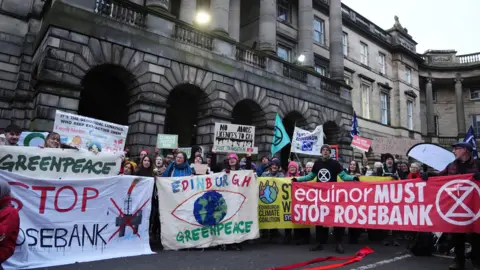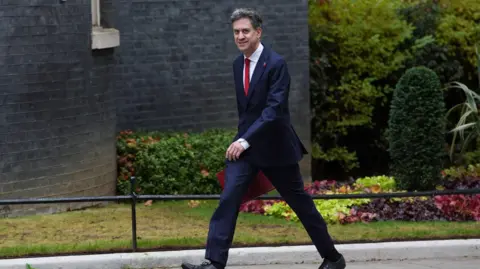
[ad_1]
 PA Media
PA MediaHow much oil – and how much profit – remain beneath the waters that buffet the British Isles?
Going by the number of lawyers packed into the Court of Session in Edinburgh this week, it must be a decent amount.
Seven advocates squeezed into the front row of courtroom number one where environmental campaigners are challenging the government’s approval of the Rosebank and Jackdaw fields.
Behind them, a further three rows were also packed with lawyers, tapping on laptops and scribbling in notebooks. Such an army obviously does not come cheap.
Remarkably they all agree on one basic fact – the Rosebank oil field in the Atlantic and the Jackdaw gas development in the North Sea were approved unlawfully.
However, the lawyers disagree sharply about what, if anything, should be done about it.
The person who must decide is Andrew Stewart, better known by his judicial title, Lord Ericht, who is presiding over this judicial review of the UK government’s decisions to approve the fields.
The previous Conservative administration and the oil and gas regulator consented to Jackdaw in summer 2022, with its owner Shell saying the field would be able to provide gas to 1.4 million British homes.
 PA Media
PA MediaCounsel for Equinor said it was investing £2.2bn in Rosebank, providing employment for 4,000 people.
Shell’s lawyer said it was investing £1.1bn in the Jackdaw gas field in the North Sea, employing “at least 1,000” people between 2023 and 2025.
Production is scheduled to begin at Jackdaw in 2026 and at Rosebank in 2026/27.
But this June a victory for climate campaigners in the UK Supreme Court sent a shiver through all three firms and the wider industry.
In Finch v Surrey County Council, which involved a dispute about drilling oil wells near London’s Gatwick Airport, the court ruled that an environmental impact assessment must include downstream emissions.
‘Simply lost a bet’
On the eve of the judicial review, Sarah Finch, the environmental campaigner after whom the Surrey case is named, told me that “the exact same thing happened at Rosebank.”
“It was granted permission with no assessment of the impact of burning the oil or gas to come out of it,” she said, adding: “So, a much bigger site, but exactly the same argument.”
The three companies involved in the Court of Session accept the Finch ruling means that, in retrospect, their licences were granted unlawfully.
However, they insist they provided all the environmental information required at the time of their applications; they were told by the industry regulator not to assess downstream emissions; and they should not be “punished” for a Supreme Court decision which they say they could not have foreseen.
Lord Ericht appeared to sum up their position succinctly on Friday, when he suggested it amounted to them asking him to say: “I accept this decision is unlawful but I give it lawful effect.”
The campaign groups Greenpeace and Uplift strongly object to any such idea.
They disagree that the decision in Finch could not have been predicted with one lawyer suggesting the oil companies had simply lost a bet.
 PA Media
PA MediaBoth groups now want the judge to pause work on Rosebank and Jackdaw while the fields’ downstream emissions are assessed.
Then, they argue, the Energy Secretary, Ed Miliband, and the government’s North Sea Transition Authority (formerly known as the Oil and Gas Authority), could make a fresh decision about the fields’ licences, armed with a fuller understanding of their contribution to climate change.
Even then, there may be a snag. Lawyers for the government, who were also in court, say they have doubts that Mr Miliband has the necessary legal power to revisit the decisions at all.
If Mr Miliband does have the power, and if it does come to the crunch, it is not clear what he would do. In court, the UK government’s lawyer was reluctant to be drawn on the matter.
At times he sounded as if ministers very much wished the whole affair would simply go away.
After all, in campaigning against the Tories in the general election this summer, Labour had carefully crafted a policy which appeared designed to minimise controversy, and to avoid becoming dragged into the debate about Rosebank.
It went like this — Labour was committed to tackling climate change by reducing greenhouse gas emissions but also recognised the importance of the oil and gas industry.
As such it would not grant any new exploration licences in UK waters but it would allow existing projects — including Rosebank and Jackdaw — to continue.
Ministers spoke of domestic energy production as critical for keeping bills down; helping to ensure the nation’s energy security; generating taxes; and for assisting with the transition from fossil fuels to renewable energy.
Many of those claims are contested by environmentalists.
 PA Media
PA MediaTessa Khan, executive director of Uplift, said 80% of the UK’s oil was exported.
“There’s no world in which you could have a robust environmental assessment that takes into account those downstream emissions and decide that those environmental impacts are acceptable,” she told me.
In Aberdeen though, the heart of the UK’s energy industry, there is a great deal of nervousness about the potential impact of the decision in this case, and about the wider impact of government policy on the sector.
Just last week, one US oil firm said it would end all North Sea operations by the end of 2029 because of high levels of taxation.
Now, the eyes of climate campaigners, politicians, and oil companies alike are on Lord Ericht.
Perhaps he will find a compromise, for example by allowing the oil firms to proceed with preparatory works – as long as they don’t extract any oil and gas – while at the same time requiring them to provide the government with information on downstream emissions to enable them to revisit the decision.
The companies’ lawyers bridled at the suggestion that they were in the business of gambling but, in such a case, maybe they would have little choice but to bet that the politics of pulling the plug would be too painful for Sir Keir Starmer’s government.
Late on Friday afternoon, the judge retired to consider his decision, a process which could take several weeks or even months.
Thanking the many lawyers for their “excellent contributions,” he concluded the hearing by saying: “It’s a very difficult matter and it’s a very important matter,” adding, “I shall issue my judgment in due course.”
[ad_2]
Source link
